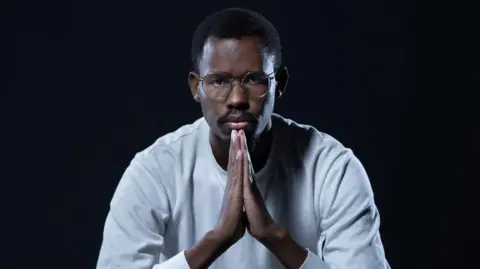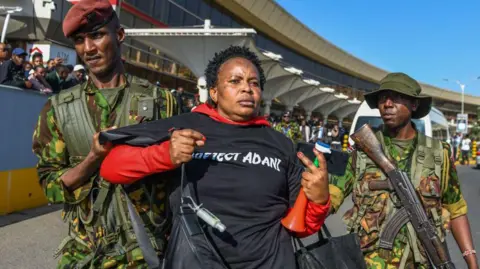 AFP
AFPKenyan business school student Nelson Amenya has been hailed as a hero by those calling for greater transparency in government-private business dealings.
Kenya’s recent history is littered with stories of huge contracts resulting from corruption – and despite laws that are supposed to prevent this, there are suspicions that it continues to happen.
Amenya, 30, who is studying for an MBA in France, took to social media to leak details of what he said was a July deal between Kenya and Indian multinational Adani Group.
It concerns the management of the Jomo Kenyatta International Airport (JKIA), the largest airport in the country and the region, which is long overdue for an overhaul.
“My first feeling [when I was passed the documents] “This is just another government deal… I don’t understand the scale or the gravity of it,” Mr Amenia, whose profile as an anti-corruption campaigner has been growing, told the BBC.
The documents detail a $2bn (£1.6bn) proposal from Adani Group to lease JKIA for 30 years to modernize and operate it.
When he began reviewing the documents, he felt that if it continued, “it would harm the Kenyan economy” and all the benefits would go to Indian multinationals.
Based on what he had read, the deal seemed unfair to him as Kenya would still put in the lion’s share of the money but would not receive a financial return.
Mr. Amenia had good reason to believe the documents were authentic because “the people who provided them to me were from very legitimate government agencies,” he said.
Adani Group is involved in global infrastructure, mining and energy projects in countries such as Israel, the United Arab Emirates, France, Tanzania, Australia and Greece. Its founder, Gautam Adani, is a major player in the Indian economy and a close ally of Prime Minister Narendra Modi.
Mr. Amenya said that on further reading, he discovered that Adani’s deal with Kenya could obligate his country to pay the company if it was unable to recoup its investment.
“The leadership of the president, the Kenya Airports Authority, the ministers have grossly breached the trust of the people and they have all betrayed the people,” he claimed.
Even with the evidence in hand, Mr. Amenya is still wondering what to do next. His own security was threatened, although he was better off in France than in Kenya, where anti-corruption activists were targeted and some were killed.
“I’m a little scared. I don’t know what’s going to happen. I’m risking my career, my life, why should I take this risk?” he asked himself at the time.
But eventually he decided staying silent wasn’t an option.
“You know, only cowards live long.”
Mr Amenya spent weeks scrutinizing the documents he received and leaked them on his X page in July, sparking immediate outrage in Kenya.
JKIA airport staff went on strike, demanding cancellation of deal.
 Getty Images
Getty Images“It feels like a responsibility to me, to my country. Even though I am far away, I still have a responsibility to my country. I want to see a better Kenya and my country become developed. , industrialization and ending corruption.
He worries the airport deal is a harbinger of what could come next.
Mr Amenya said it was not just the unusual provisions and lack of transparency that set off alarm bells, he also claimed Kenya’s laws appeared to be systematically ignored.
“[The authorities] No due diligence was ever done on this company…they did not follow proper procurement procedures.
He claimed that some government officials wanted to bypass legal requirements, including public consultation, that were supposed to prevent taxpayer money from being misused.
An April report from the Kenya Airports Authority on the proposed deal highlighted that there were no plans to consult stakeholders on the scheme.
“This was in April and by the time I broke the story in July they had not done any public engagement. The deal was quite secretive and they were only a month away from signing it at that time,” Mr Amenya claimed .
“After I exposed the deal, they rushed to try to fake public involvement – they called Kenya Airports Authority staff and started holding stakeholder meetings.”
Multiple officials and state agencies denied accusations of corruption in the process, and authorities subsequently signed another multimillion-dollar deal with Adani – this time to build power lines.
Adani Group said Mr Amenya’s claims were baseless and malicious.
“The proposal was submitted under Kenya’s public-private partnership regulations to create a world-class airport and significantly strengthen the Kenyan economy through the creation of significant new jobs,” a spokesperson told the BBC.
Adani Group further said that no contract had been signed as “the discussions did not result in a binding agreement”.
The company also said the proposed energy deal was above board and that it “categorically refutes all allegations and suggestions that our operations or proposals violate Kenyan law.”
“Every project we undertake is governed by an unwavering commitment to compliance, transparency and the laws of the countries in which we operate,” the statement read.
But it wasn’t Mr Amenya’s leaks that really changed the government’s mind.
It was only after US authorities charged Gautam Adani with his involvement in a $250m (£200m) bribery scheme that Kenya took action.
Representatives of Adani Group denied the accusations made by US prosecutors and called them “baseless”.
Last month, Kenyan President William Ruto announced the cancellation of two Adani deals during his State of the Nation Address in Parliament.
“I will not hesitate to take decisive action in the face of indisputable evidence or credible information about corruption,” Ruto said in a speech that drew loud cheers in parliament.
Kenyans celebrated the decision, which Ruto attributed to new information from investigative agencies and partner countries.
“I was in class when the news came out. I couldn’t believe it,” Mr. Amenya said.
“I think for the first hour I had tears in my eyes. I was so happy.”
Although he doesn’t consider himself a hero, messages of support poured in from around the world, including from India.
Forty minutes after the class ended, he posted the now-famous tweet “Bye Adani!!” – Bye Adani.
“It’s a big deal…everything I’ve done is finally paying off.”
However, the feeling of victory came after months of personal struggle and stress.
Soon after the airport deal came to light, Amenya was sued for defamation by Adani Group representatives and Kenyan politicians, leaving him questioning whether he should continue.
“Some people came to me from the government and they were even prepared to pay me, and they told me: ‘You need to cash in and stop fighting the government,'” he recalled.
“Giving up would be the biggest mistake of my life and a betrayal of the Kenyan people.”
But even after canceling the deals, President Ruto still questions why Kenyans oppose this and many others he has supported. He said he would find ways to upgrade the airport.
“I see them saying that those who stop our airports from being upgraded are heroes. Heroes? What do you gain when you stop building airports in your country?” Ruto asked at a public event in early December.
“You don’t know how it’s going to be built, and those who are against it have never even set foot in the airport, and you just want to be against it.”
Mr Amenia, who still faces a defamation case and is raising money to help pay legal fees, said his future in Kenya was uncertain.
“I received threats from credible intelligence agencies and Kenyans who warned me not to go back because obviously some people were very angry about what I had done,” he said.
It’s a steep price, but one Mr Amenya said he would be happy to pay again.
“We really don’t need to wait for someone to save us,” he said.
You may also be interested in:
 Getty Images/BBC
Getty Images/BBC
